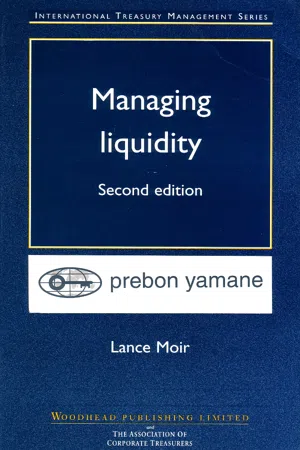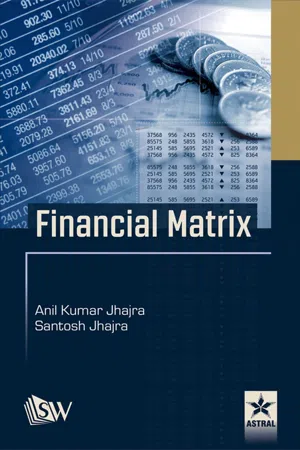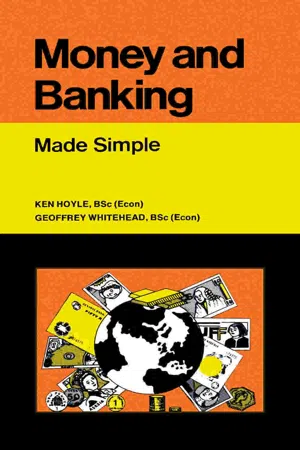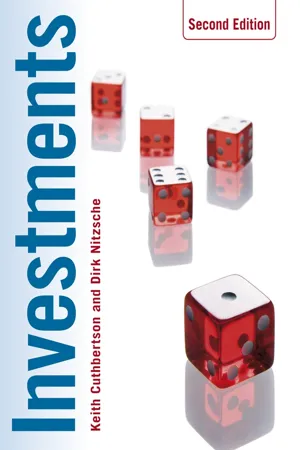Economics
Certificate of Deposit
A Certificate of Deposit (CD) is a financial product offered by banks and credit unions that allows individuals to deposit funds for a fixed period of time at a specified interest rate. CDs typically offer higher interest rates than regular savings accounts, but they often have penalties for early withdrawal. They are considered low-risk investments.
Written by Perlego with AI-assistance
Related key terms
1 of 5
5 Key excerpts on "Certificate of Deposit"
- eBook - PDF
- Lance Moir(Author)
- 1997(Publication Date)
- Woodhead Publishing(Publisher)
• Profitability. These deposits (via L I B O R ) tend to be the bench-mark against which other investments m a y be measured. Yield will also depend upon the risk of the individual bank. • Flexibility. Deposits can be for any a m o u n t (subject to very large amounts) and for individually selected dates (with less ease over 1 year). C e r t i f i c a t e s o f d e p o s i t A Certificate of Deposit (CD) is a n e g o t i a b l e b e a r e r i n s t r u m e n t certificate issued b y a b a n k or b u i l d i n g society e v i d e n c i n g a deposit. T h e s e certificates m a y b e t r a d e d in a fairly active s e c o n d a r y m a r k e t a n d a r e p r i c e d as a function of t h e p r i n c i p a l invested, t h e stated r e t u r n o n t h e C D a n d c u r r e n t m o n e y -m a r k e t interest rates. B a n k s h a v e issued C D s since 1968 a n d o t h e r institutions s u c h as U K b u i l d i n g societies a n d savings & loans in t h e U S also issue C D s . A C D m a y theoretically b e sold at a n y d a t e u p to its m a t u r i t y . H o w e v e r , t h e liquidity of a n y p a r t i c u l a r C D will d e p e n d u p o n t h e quality of t h e issuer. M a n y b a n k s h o l d e a c h o t h e r s ' C D s as p a r t of their o w n liquidity m a n a g e -m e n t . C D s a r e available for p e r i o d s u p to 5 years ( a l t h o u g h t h e y a r e less c o m m o n a b o v e 1 year) a n d c a n b e q u o t e d o n either a fixed r a t e o r floating r a t e basis. F o r v e r y s h o r t t e r m C D s t h e r e is n o difference, b u t for l o n g e r p e r i o d s floating r a t e C D s h a v e their c o u p o n reset e v e r y 6 m o n t h s . - eBook - PDF
- Jhajra, Anil Kumar(Authors)
- 2021(Publication Date)
- Scholars World(Publisher)
Cannot be resold/distributed. types of Treasury Securities directly from the U.S. Government. With the help of TreasuryDirect, T-Bills can be bought online, and funds can be withdrawn and deposited to the personal bank accounts of the investors. T-Bills make it possible for investors to have more earnings on their savings. Certificates of Deposit What is a Certificate of Deposit (CD)? A Certificate of Deposit (CD) is like a loan from an investor to a bank or similar thrift institution. It is issued by these banking institutions and pays interest. CDs are among the most widely used money market instrument by investors overall. They are issued for varying maturities, and earn interest based on this maturity. The most common CDs include 31-day and 91-day maturities. For these CDs, the yields are tied to the 13-week Treasury bill rate. Six-month and 30-month CDs will generally yield higher rates, and they are also tied through some formula to Treasury bills. They are useful for the average investor because they are available in sums as little as $100. Bank CDs can be tailored to meet your individual requirements, as well. They are one of the most flexible investing tools. CDs are like bank deposits and are covered by federal insurance up to $100,000 per account. Terms and conditions There are many variations in the terms and conditions for CDs. In the US, the federally required “Truth in Savings” booklet, or other disclosure document that gives the terms of the CD, must be made available before the purchase. Employees of the institution are generally not familiar with this information; only the written document carries legal weight. If the original issuing institution has merged with another institution, or if the CD is closed early by the purchaser, or there is some other issue, the purchaser will need to refer to the terms and conditions document to ensure that the withdrawal is processed following the original terms of the contract. - eBook - PDF
Money and Banking
Made Simple
- Ken Hoyle(Author)
- 2014(Publication Date)
- Made Simple(Publisher)
The discount houses will quote prices for all maturities from one day to five years. They are dealt with on an interest-accrued basis, so that at any given moment a certificate is worth its face value plus the interest earned to date. However, the calculation of the actual value does depend upon the purchaser's estimate of what is a fair rate of interest for the days left to run to maturity, and also on his own view of the present liquidity position. The resulting calculation is somewhat complex, but a leaflet explaining the point can be obtained from discount houses in the secondary market. Since certificates of deposit are issued in 'bearer' form, for very large sums, they must be held by an authorised depository, i.e. a bank. The function of the discount houses is to make a secondary market in the certificates: they do not issue new certificates—these are issued by most leading merchant banks. 5.3 Financial Markets As suggested earlier, financial markets differ from money markets in that they deal in medium and long-term funds. While the primary purpose of money markets is to manage the day-to-day cash positions of businesses and banks, the longer-term markets are concerned with the provision of capital for other purposes. One common requirement is capital which can be 'fixed' as 'fixed assets' in a huge range of industries, from coalmines, steelworks, heavy and fight industries down to service trades like communications and transport. The availability of capital of this sort is of crucial importance to any economy, and somewhat difficult to arrange in the present climate of industrial unrest, foreign competition and cut-throat international trade. The market for new issues of capital of this sort is the 'New Issue' market, while the Stock Ex-change is the market for 'existing' stocks and shares, where those whose capital is fixed may regain liquidity by selling the stocks and shares they no longer require. - eBook - PDF
Wiley Pathways Personal Finance
Managing Your Money and Building Wealth
- Vickie L. Bajtelsmit, Linda G. Rastelli(Authors)
- 2012(Publication Date)
- Wiley(Publisher)
If you need your funds before the end of the CD term, you can generally get them, but you incur a penalty—a sharply reduced interest rate, usually equivalent to a demand deposit rate. If you cash out a CD within a short time, you may even pay a penalty fee in addition to that. It makes sense to manage your money so as to minimize the likelihood that this kind of thing will happen. One way is to separate your investments into several smaller CDs that mature at different times, a strategy sometimes called “laddering.” Instead of putting $10,000 in a CD that matures in 5 years, for example, you might put $5,000 in the 5-year CD, $3,000 in a 2-year CD, $1,000 in a 12-month CD, and $1,000 in a 6-month CD. Although you earn lower 90 MANAGING YOUR CASH AND SAVINGS rates on the shorter-term CDs, the reduced risk of incurring an early with- drawal penalty may outweigh the opportunity cost. When a CD matures, your financial institution usually automatically rolls over the funds into a comparable account unless you file the necessary paperwork. For example, if you have your money in a 1-year CD, the institution rolls it into another 1-year CD at maturity. Your financial institution may offer special types of CDs. With so many alternatives to consider, you need to make sure you fully understand the terms of a CD before you invest. The FDIC, Web site at www.fdic.gov, offers several tips for investors in CDs to consider. ▲ Money market mutual funds: As described in Section 4.3.2, mutual fund companies are financial companies that pool investors’ funds and use the money to purchase a variety of financial assets. Most companies now offer one or more money market mutual funds with characteristics that make them alternatives to other liquid savings accounts (e.g., limited check-writing privileges). These funds invest in short-term, low-risk financial assets, such as short-term debt securities called money market securities, which is why the funds are called money market mutual funds. - eBook - PDF
- Keith Cuthbertson, Dirk Nitzsche(Authors)
- 2014(Publication Date)
- Wiley(Publisher)
US certificates of deposit As in the UK, CDs are traded on a yield basis, however US CDs use a day count of actual/360. CDs may be negotiable or non-negotiable. For the latter, the funds can only be withdrawn before the maturity date if a withdrawal penalty is paid. Negotiable CDs can be repeatedly sold in the 0.44% ( = 6.02% - 5.58%) 26.67% 3 = $0.4bn> $1.5bn4 UK AND US INSTRUMENTS 431 open market. Negotiable CDs are usually issued in denominations of $1m or more and have maturities greater than seven days and less than one year. However, some term CDs with maturities greater than one year are also issued. Normal CDs pay interest at maturity, while term CDs pay interest semi-annually. The yield on CDs depends in part on the credit rating of the issuing bank, and their liquidity. CDs that are issued outside the US but denominated in dollars are known as Eurodollar CDs, while Yankee CDs are denominated in dollars but issued by a foreign bank with branches in the US. Table 19.7 shows the calculation of principal plus interest and Table 19.8 demonstrates how the purchase price of a CD in the secondary market is calculated. Comparing rates Obviously, in comparing the return on two money-market assets one cannot use a discount rate for one asset and the yield for another. Even when both assets are quoted on a yield basis, one has to ascertain whether they use the same day-count convention. In general, in compar- ing the rates on assets using different trading rates or day-count bases, you should first con- vert to prices. The return can then be recalculated on a consistent basis. To demonstrate how we move from the rates quoted ‘on the street’ to a measure of return, consider a US T-bill with 90 days to maturity with a quoted discount rate of 10% (actual/360) and a 90-day Eurodollar deposit (actual/360) with a quoted yield of 10%: MONEY MARKETS 432 TABLE 19.7: US certificates of deposit Data Notional $1m, 90-day CD with 7% yield.
Index pages curate the most relevant extracts from our library of academic textbooks. They’ve been created using an in-house natural language model (NLM), each adding context and meaning to key research topics.




